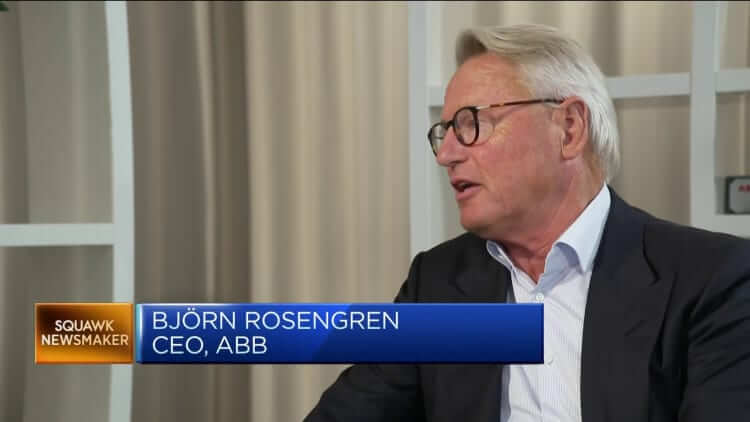Bjorn Rosengren, the CEO and chairman of ABB, a multinational robotics firm headquartered in Sweden and Switzerland, has expressed disappointment with the state of the Chinese market. He anticipates that conditions in China will remain challenging for the rest of the year. This sentiment comes amid concerns about China’s economic stability, particularly in the real estate sector.
Rosengren highlighted that ABB has been negatively affected by a softening in China’s property sector. The decline in Chinese real estate development, coupled with significant debts in the sector, has had a detrimental impact on ABB’s residential construction segment. This segment is more cyclical and susceptible to changes in the overall economy.
“We are pretty pessimistic at the moment about China,” said Rosengren. He mentioned that earlier in the year, there were hopes for a post-COVID recovery, but those expectations have not materialized. China, often referred to as “the world’s factory,” is a significant market for ABB, and its performance is considered a barometer for the broader manufacturing sector and the global economy.
Despite being the leading player in the Chinese robotics market, accounting for over 90% of sales from locally-made products, solutions, and services, ABB has observed signs of weakness. In the second quarter of 2023, ABB reported a 2% increase in orders on a comparable basis, totaling $8.7 billion, with comparable revenues up 17% to $8.2 billion. However, in China, the firm experienced a 9% decline in order intake on a comparable basis during the same period.
The Chinese real estate sector has been in turmoil for the past two years, highlighted by the financial troubles of heavily indebted property developer Evergrande, which filed for U.S. bankruptcy protection. Over 50 Chinese property developers have defaulted or failed to make payments in the last three years, according to Standard and Poor’s.
Recent concerns about China’s economy include issues such as high levels of debt, an aging population, youth unemployment, and growing tensions with the United States. These factors have raised fears of a potential economic “decoupling” from the rest of the world.
Despite the challenges in China, Rosengren noted that electric mobility is a fast-growing area for ABB globally, especially in China. Electric vehicles (EVs) are gaining popularity, both in China and Europe, contributing positively to the robotics market.
ABB is currently planning an initial public offering (IPO) for its e-mobility business, having raised 325 million Swiss francs ($370.6 million) from investors in a pre-IPO placement. Rosengren emphasized that many businesses and governments are aligned in their efforts to transition to green energy, providing significant growth opportunities.
In Europe, the urgency to accelerate the energy transition has increased due to Russia’s invasion of Ukraine and subsequent natural gas supply restrictions. Rosengren highlighted the importance of green energy generation and electrification infrastructure globally, indicating a strong market for electrification.
ABB’s e-mobility division is responsible for developing electric charging solutions, which are essential for the EV industry. However, this division faced challenges in the second quarter, with a $67 million loss attributed to inventory-related provisions and technology investments as part of a strategic shift to maintain a leading market position.
ABB’s CEO, Bjorn Rosengren, has expressed disappointment with the Chinese market’s performance and anticipates ongoing challenges for the remainder of the year. Despite this, ABB is optimistic about the growth of electric mobility and the importance of green energy solutions on a global scale.





